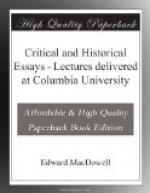That the lyre and lute are of Asiatic origin is generally conceded, and even in comparatively modern times, Asia seems to be the home of its descendants. The Tartars have been called the troubadours of Asia—and of Asia in the widest sense of the word—penetrating into the heart of the Caucasus on the west and reaching through the country eastward to the shores of the Yellow Sea. Marco Polo, the celebrated Venetian traveller, and M. Huc, a French missionary to China and Thibet, as well as Spencer, Atkinson, and many others, speak of the wandering bards of Asia. Marco Polo’s account of how Jenghiz Kahn, the great Mongol conqueror, sent an expedition composed entirely of minstrels against Mien, a city of 30,000 inhabitants, has often been quoted to show what an abundance—or perhaps superfluity would be the better word—of musicians he had at his court.
That the lyre could not be of Greek origin is proved by the fact that no root has been discovered in the language for lyra, although there are many special names for varieties of the instrument. Leaving aside the question of the geographical origin of the instrument, we may say, broadly, that wherever we find a nation with even the smallest approach to a history, there we shall find bards singing of the exploits of heroes, and always to the accompaniment of the lyre or the lute. For at last, by means of these instruments, impassioned speech was able to lift itself permanently above the level of everyday life, and its lofty song could dispense with the soft, sensuous lull of the flute. And we shall see later how these bards became seers, and how even our very angels received harps, so closely did the instrument become associated with what I have called impassioned speech, which, in other words, is the highest expression of what we consider godlike in man.
III
THE MUSIC OF THE HEBREWS AND THE HINDUS




